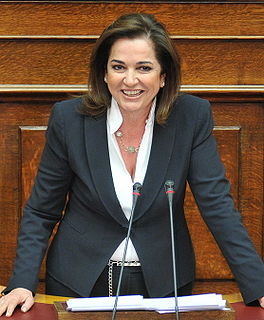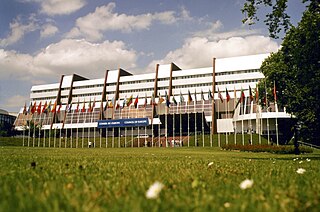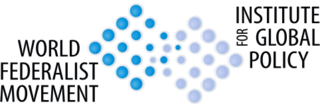Democratic globalisation is a social movement towards an institutional system of global democracy. In their view, this would bypass nation-states, corporate oligopolies, ideological NGOs, cults and mafias. One of its most prolific proponents is the British political thinker David Held. In the last decade, Held published a dozen books regarding the spread of democracy from territorially defined nation states to a system of global governance that encapsulates the entire world. For some, democratic mundialisation is a variant of democratic globalisation stressing the need for the direct election of world leaders and members of global institutions by citizens worldwide; for others, it is just another name for democratic globalisation.

Theodora "Dora" Bakoyannis, is a Greek politician. From 2006 to 2009 she was Minister of Foreign Affairs of Greece, the highest position ever to have been held by a woman in the Cabinet of Greece at the time; she was also Chairperson-in-Office of the Organization for Security and Co-operation in Europe in 2009. Previously she was the Mayor of Athens from 2003 to 2006, the first female mayor in the city's history, and the first woman to serve as mayor of a city hosting the Olympic Games. She also served as Minister for Culture of Greece from 1992 to 1993. She has been serving as an independent member of the Hellenic Parliament representing unofficially Democratic Alliance, the political party she founded in 2010, having been expelled from the opposition New Democracy party due to voting against the party line. In May 2012, due to the critical situation in Greece before the elections and given the established electoral law, Democratic Alliance decided to cooperate with New Democracy, based on a specific framework of values and to suspend its activities. Dora Bakoyannis rejoined New Democracy on 21 May 2012, ahead of the parliamentary election in June, where she headed the state deputies' ballot.
Douglas James Roche, OC, KCSG is a Canadian author, parliamentarian, diplomat and peace activist. Roche served as Progressive Conservative Member of Parliament (MP) for Edmonton—Strathcona from 1972 to 1979 and for Edmonton South 1979-1984. In 1984, he was appointed Canada's Ambassador for Disarmament, a position he held until 1989. He was appointed to the Senate of Canada on September 17, 1998, where he served until June 13, 2004. Currently he resides in Edmonton, Alberta.

The International Republican Institute (IRI) is a nonprofit, nonpartisan organization committed to advancing freedom and democracy worldwide by helping political parties to become more issue-based and responsive, assisting citizens to participate in government planning, and working to increase the role of marginalized groups in the political process – including women and youth.

The International Foundation for Electoral Systems (IFES) is an international, non-profit organization founded in 1987. This Washington, D.C.-based development organization provides assistance and support for elections in new and emerging democracies. Since 1987, IFES has provided assistance in 145 countries and it currently has programs in over 20 countries throughout Asia-Pacific, Africa, Eurasia, the Middle East and North Africa, and the Americas.
Douglas Charles Rowland, is a Canadian former politician.

A United Nations Parliamentary Assembly (UNPA) is a proposed addition to the United Nations System that would allow for greater participation and voice for Members of Parliament. The idea was raised at the founding of the League of Nations in the 1920s and again following the end of World War II in 1945, but remained dormant throughout the Cold War. The Campaign for a United Nations Parliamentary Assembly (CEUNPA) was formed in 2007 by Democracy Without Borders to coordinate pro-UNPA efforts, which as of June 2017 has received the support of nearly 1,500 Members of Parliament from over 100 countries worldwide. The Commission on Global Security, Justice and Governance, chaired by former U.S. Secretary of State Madeleine Albright and former Nigerian Foreign Minister Ibrahim Gambari, has called for the creation of a United Nations Parliamentary Network "to raise greater awareness and participation by strengthening the voices of legislators in global institutions." The commission proposes that this Network "would be similar in initial composition to the Parliamentary Network on the World Bank and International Monetary Fund and the Parliamentary Conference on the World Trade Organization".
The Parliamentary Assembly of the OSCE is an institution of the Organization for Security and Co-operation in Europe. The primary task of the 323-member Assembly is to facilitate inter-parliamentary dialogue, an important aspect of the overall effort to meet the challenges of democracy throughout the OSCE area. The Parliamentary Assembly pursues objectives which are stated in the preamble of the Assembly's Rules of Procedure: assess the implementation of OSCE objectives by participating States; discuss subjects addressed during meetings of the Ministerial Council and summit meetings of OSCE Heads of State or Government; develop and promote mechanisms for the prevention and resolution of conflicts; support the strengthening and consolidation of democratic institutions in OSCE participating States; contribute to the development of OSCE institutional structures and of relations and co-operation between existing OSCE institutions.

Québec solidaire is a democratic socialist, social-democratic and sovereigntist political party in Quebec, Canada. The party and media outlets in Canada usually use the name "Québec solidaire" in both French and English, but the party's name is sometimes translated as "Solidarity Quebec" or "Quebec Solidarity" in foreign English-language media.

The Congress of Local and Regional Authorities (CLRA) is the pan-European political assembly representing local and regional authorities from the forty-seven member states of the Council of Europe. Its role is to promote local and regional democracy, improve local and regional governance and strengthen authorities' self-government, according to the principles laid down in the European Charter of Local Self-Government. It is made up of two chambers, the Chamber of Local Authorities and the Chamber of Regions and holds its plenary sessions twice a year at the Palace of Europe in Strasbourg, where its permanent Secretariat is located.
The Electoral Institute for Sustainable Democracy in Africa, or EISA, is an organization founded in 1996 in Johannesburg to "promote credible elections, participatory democracy, human rights culture and the strengthening of governance institutions for the consolidation of democracy in Africa."

The Global Greens (GG) is an international network of political parties and movements which work to implement the Global Greens Charter. It consists of various national Green political parties, partner networks, and other organizations associated with green politics.
The European Parliament Former Members Association is an Association of former members of the European Parliament, involved in promoting the European Parliament and the European Union, as well as election monitoring, among other activities.

Presidential elections were held in Azerbaijan on 9 October 2013. The result was a victory for incumbent President Ilham Aliyev, who received 84.5% of the vote, whilst leading opposition candidate Jamil Hasanli finished second with 5.5% of the vote.

The World Federalist Movement (WFM) is a global citizens movement that advocates the establishment of a global federal system of strengthened and democratic global institutions subjected to the principles of subsidiarity, solidarity and democracy. Famous advocates of world federalism include Albert Einstein, Mahatma Gandhi, Martin Luther King Jr., Rosika Schwimmer, Albert Camus, Winston Churchill, Garry Davis, Emery Reves, Wendell Willkie, Jawaharlal Nehru, E. B. White and Lola Maverick Lloyd. The organization was created in 1947 by those concerned that the structure of the new United Nations was too similar to the League of Nations which had failed to prevent World War II, both being loosely structured associations of sovereign nation-states, with few autonomous powers.
Electoral integrity refers to international standards and global norms governing the appropriate conduct of elections.

The European Centre for Electoral Support (ECES) is a not for profit private foundation, headquartered in Brussels (Belgium) and created in 2010.












